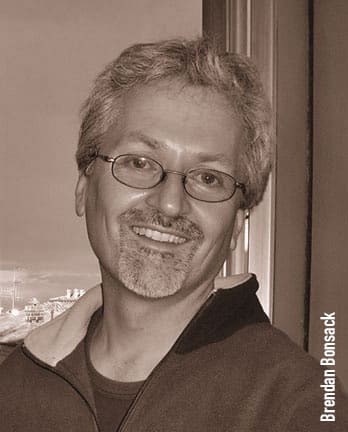Poetry

Edward Caruso
Vesuvius, nocturns
1
Seven-hour rail journey.
As our lips meet,
our cabin door thrust open,
a uniform demands tickets.
They’re handed over, punched, handed back,
the door closed as resolutely as it was opened.
We sleep in each other’s arms.
One day we’ll make love on this train.
2
Firecrackers explode across a deserted street.
Women, heavily made-up, finely dressed,
amble potholed streets arm in arm with boyfriends.
Neon lights, buildings in shadow.
Elderly faces anxious to talk of heat and dust
at the first sign of our asking directions for a port
corroded by salt and neglect.
Bands of youths, fistfights with people running in.
Shouts above the sound of shattered bone,
blood spilt across the pavement and cars speeding past.
A shopkeeper draws us over:
his neighbour is cooking pig meat.
We smell it only outside his shop.
The joys of sausages with dripping.
To roast pork and boil pig’s feet,
cut away the skin to the meat and bone beneath,
cooling them in wine, the smell of fried pig fat as it wafts.
Metres ahead, refuse and mopeds.
Vehicles – cracked windscreens, crushed panels, missing lights.
To overtake at every opportunity, one hand on the steering wheel.
It’s raining.
A porno cinema screens Seduction in the Convent.
Notes taken during the Gulf War
Urbino: a church bell
tolls every fifteen minutes
The real crisis and the imagined, existential one
I’d do anything to gamble something away,
dull colours for a moment of euphoria
There must be ways to see beyond tragedy:
Hitler in the vestiges of Stalingrad’s snows
Trojan War retellings of Hector’s fall,
those who feel alone cannot love themselves
The Cold War had so much going for it
With endless talk of invasion,
one has to deny everything, even oneself
Nature: no plans to keep our instincts in check,
I’m entitled to loathe it as much as I want
An atheist believing
that all must be raised inside the Church
Democracy: violence I never voted for
Low-level radioactive bomb fragments
blessed from the assembly line
to the great post-war democracy
Self-inflicted violence
thanks to a politics imposed from above
The deaths of pacifists in war zones
The curse of solace, of verdant passages
What happens half a world away, to one’s inner state
How will they see us in 2000 years?
What ensues after conflict
The Renaissance: Leonardo’s war machines,
Michelangelo’s shattered nose
What to make of refuge
Edward Caruso’s second collection of poems, Blue Milonga, was published by Hybrid Publishers in 2019. Recent poems have been published with StylusLit, TEXT, Unusual Work and Well-Known Corners: Poetry on the Move.
